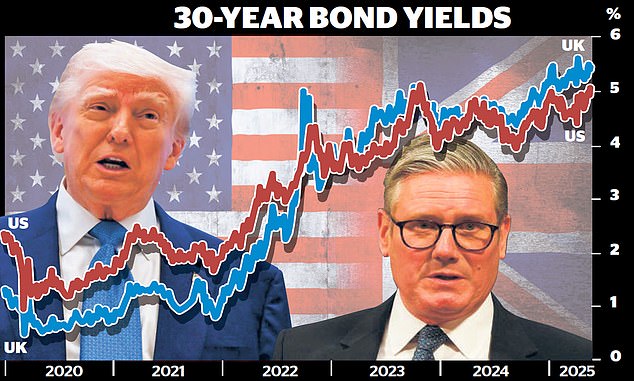Borrowing costs rose sharply yesterday as fears mounted over America’s debt pile worth £27trillion.
Long-term US bond yields hit an 18-month high after Moody’s last week downgraded the credit rating of the world’s largest economy.
Concerns that debt will spiral were fuelled by Donald Trump’s plan for tax cuts, which passed a key committee stage in Washington over the weekend.
Higher yields on US government bonds – a benchmark for borrowing costs – push up mortgage and loan repayment rates for US households and businesses, and affect other countries.
Yields on 30-year Treasury bonds passed the psychologically important barrier of 5 per cent to a high of 5.037 per cent. The rates have only breached 5 per cent a handful of times in 20 years.
The UK’s long-term borrowing costs also rose with yields on 30-year government bonds, known as gilts, now 5.5 per cent.

Trumponomics: Long-term US bond yields hit an 18-month high after Moody’s last week downgraded the credit rating of the world’s largest economy
Japan’s 30-year bond yield reached a 25-year high of 2.99 per cent. Its 40-year bond yield hit a two-decade peak of 3.46 per cent.
Meanwhile, the dollar tumbled against currencies around the world – pushing sterling above $1.34 at one point.
Stock markets slumped early on amid rising debt fears but the FTSE 100 recovered to close up 0.2 per cent, or 14.75, points at 8699.31.
On Wall Street, the S&P 500 rose 0.1 per cent, the Dow Jones 0.3 per cent and the Nasdaq 0.1 per cent.
Ed Monk, associate director at Fidelity International, said: ‘The US bond market is signalling distress. It is telling the government that if it wants to borrow for 30 years, it will have to pay 5 per cent a year for the privilege.’
He added: ‘What the American government pays to borrow influences the yield on British government debt, too.’
Rising borrowing costs are a headache for Chancellor Rachel Reeves, who may have to impose punishing tax hikes this autumn to make her sums add up.
Financial services firm Moody’s cut America’s credit rating on Friday from AAA to AA1, citing more than a decade of rising debt and interest costs. The US held an AAA rating since 1917.
Rivals Fitch and S&P stripped the country of its perfect rating in 2023 and 2011 respectively.
Susannah Streeter, at Hargreaves Lansdown, said: ‘Given the pledge by Trump to cut taxes, it’s feared the situation could deteriorate further.’
David Morrison, analyst at broker Trade Nation, said: ‘The timing is significant – in the midst of a global trade war and as the Trump administration attempts to pass a new tax package which could add between $3 to $5trillion to the budget deficit.’
DIY INVESTING PLATFORMS

AJ Bell

AJ Bell
Easy investing and ready-made portfolios

Hargreaves Lansdown

Hargreaves Lansdown
Free fund dealing and investment ideas

interactive investor

interactive investor
Flat-fee investing from £4.99 per month

InvestEngine

InvestEngine
Account and trading fee-free ETF investing
Trading 212
Trading 212
Free share dealing and no account fee
Affiliate links: If you take out a product This is Money may earn a commission. These deals are chosen by our editorial team, as we think they are worth highlighting. This does not affect our editorial independence.
This article was originally published by a www.dailymail.co.uk . Read the Original article here. .


